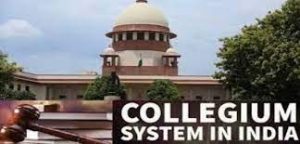Collegium System:

During Justice Chandrachud’s two-year tenure, the collegium he will head will potentially make as many as 18 recommendations for appointment of judges to the Supreme Court. It will be an unusual collegium: instead of five members, it will have six.
- The collegium system of appointing judges evolved through three significant verdicts of the Supreme Court, known as the First, Second, and Third Judges Cases.
- The Constitution of India does not mention the collegium system; however, these three cases established that the collegium headed by the Chief Justice of India will have primacy in the appointment of judges to the higher judiciary.
- The Supreme Court collegium is headed by the CJI and comprises four other senior-most judges of the court.
- This collegium makes recommendations to the government for appointment of judges to the SC and of Chief Justices of High Courts, and the transfers of HC judges.
- A separate three-member collegium, headed by the CJI and comprising the two senior-most judges of the SC makes recommendations for appointment of judges to HCs.
Background of Collegium system:
- First Judges Case (1981): It declared that the “primacy” of the Chief Justice of India (CJI)’s recommendation on judicial appointments and transfers can be refused for “logical reasons.”
- The ruling gave the Executive primacy over the Judiciary in judicial appointments for the next 12 years.
- Second Judges Case (1993): SC introduced the Collegium system, holding that “consultation” really meant “concurrence”.
- It was not the CJI’s individual opinion, consultation with the two senior-most judges in the SC.
- Third Judges Case (1998): SC on President’s reference expanded the Collegium to a five-member body, comprising the CJI and four of his senior-most colleagues.
5+1 collegium:
- Given the order of seniority, a potential CJI will enter the Chandrachud collegium only in May 2023. However, Justice Khanna will be the sixth member of the collegium from November 9, 2022 itself.
- This happened earlier in 2007 — when then CJI K G Balakrishnan took the top office, the collegium he headed did not have a potential CJI candidate. Justice S H Kapadia, who was next in line to be CJI, was invited to the collegium as the sixth member.




